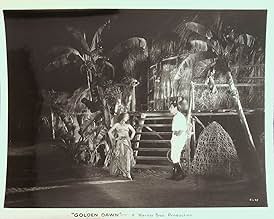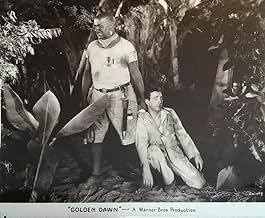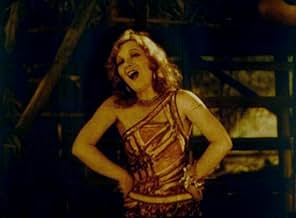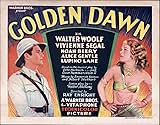Aggiungi una trama nella tua lingua"Golden Dawn" is a musical operetta released by Warner Brothers, photographed entirely in Technicolor, and starring Walter Woolf King and Noah Beery. The film is based on the semi-hit stage ... Leggi tutto"Golden Dawn" is a musical operetta released by Warner Brothers, photographed entirely in Technicolor, and starring Walter Woolf King and Noah Beery. The film is based on the semi-hit stage musical of the same name by Oscar Hammerstein II and Otto Harbach."Golden Dawn" is a musical operetta released by Warner Brothers, photographed entirely in Technicolor, and starring Walter Woolf King and Noah Beery. The film is based on the semi-hit stage musical of the same name by Oscar Hammerstein II and Otto Harbach.
- Regia
- Sceneggiatura
- Star
- Tom Allen
- (as Walter Woolf)
- Piper
- (as Sojin)
- Secondary Supporting Role
- (non citato nei titoli originali)
- Hasmali - the Witch Doctor
- (non citato nei titoli originali)
- Napoli
- (non citato nei titoli originali)
- Secondary Supporting Role
- (non citato nei titoli originali)
- Secondary Supporting Role
- (non citato nei titoli originali)
Recensioni in evidenza
Inconsistencies and absurdities abound, the most flagrant being the portrayal of a native go- between by Noah Beery in blackface and a ridiculously inappropriate Stepin Fetchit accent; among the most straight-out entertaining sequences are songs added for the film version: "We Two" sung winningly by ace music hall veteran Dick Henderson with Marion Byron. Byron also delights with "A Tiger" – another jazzy number which she milks to the last drop of her pint-sized self. The other, slower songs which came from the stage original ("My Bwana," "Dawn," and "Mooda's Song") fare less well and are harder to understand, despite the fine voices of Segal, leading man Walter Woolf and Alice Gentle as Segal's "mother." Lupino Lane does some astounding acrobatics for "In a Jungle Bungalow." This is not the only bad musical film he enlivened.
The campiest moments occur during the climax when the white girl is about to be married to Mulungu by a bug-eyed, blacked-up witch doctor (Nigel de Brulier) who delivers his lines like a 19th century Shakespearean ham. The rock-bottom melodramatics are so over the top by the time you get to the atrociously dubbed finale, nothing matters any more. You can either goof on it or shrug, be grateful that those days are over, and move on to something more edifying. All in all, a fun fest for parties of musical theatre/musical film aficionados. This movie is to musicals what "Plan Nine from Outer Space" is to science fiction.
This film definitely did not turn out like Warner Brothers expected, I'm sure. It failed at the box office and is today a very unintentionally funny film. The film is set during the first World War in Africa. It is about a native girl, Dawn (Vivienne Segal), who has supposedly been blessed by the gods to appear white, thus marking her as the future bride of the native's god - a statue that appears to be a giant likeness of Mr. Bill from the old 70's skits on Saturday Night Live. A British soldier loves Dawn, but their love is thwarted at every turn both by the fact that the occupying Europeans don't want any trouble with the natives, which they'd have if Tom Allen (Walter Woolf King) eloped with the bride of the native god, and by Shep Keyes, a native bully and strong man who wants Dawn for himself.
Shep (Noah Beery) is supposed to be an African native, yet his name and his accent are purely Gone with the Wind. Plus his black-face makeup is very obviously melting off of his body through his clothing under the hot Technicolor lights, but nobody seems to notice.
There are a large group of civilian Americans and Europeans in the story, and the reason for their presence in this remote African village is never explained. Neither is any reason given as to why they all speak like they're from Queens. One of the things in this film that does work as funny and probably intentionally so is the wiry anemic Ned Sparks-like Lee Moran as Blink and Marion Byron as Joanna, Blink's rough and bossy girlfriend. The one number that works in this film is their rendition of the Song "A Tiger", which Joanna certainly is and Blink definitely is not.
This film, made in 1930, is still using title cards to transition between scenes, something that was still common in the late Vitaphone era. However, even here there are laughs to be found. One title card reads "There was no joy among the natives. A draught was destroying them." As there is no mention of beer or wind in this film, I can only assume the title card writer meant "draught" to be "drought".
For a little over an hour of campy fun in the tradition of "The Dueling Cavalier" in Singin in the Rain, you just can't beat this one.
The songs which were written by Otto A. Harbach & Oscar Hammerstein II are superb. I especially love the song "Dawn" as sung by Walter Woolf King who has a delightful baritone voice.
Noah Beery is great as the villain and his bass voice is amazing. Vivienne Segal has the least impressive voice of the cast but is still pleasing.
"In a Jungle Bungalow" sung by Lupino Lane and chorus is another pleasing song.
Some of the reviewers on here are clearly clueless. There is nothing racist about this film. As a matter of fact, the film was banned from many Southern states because it was the exact opposite. Racist audiences were offended by a white man (Walter Woolf King) falling in love with a woman (Vivienne Segal) who had a black mother (Alice Gentle). If you examine the period film trade publications made available by the Media History on the Internet Archive you can verify this fact.
Calling Noah Beery racist for portraying a black man is as absurd as calling Lon Chaney's portrayal of a Chinese man racist in the 1927 picture "Mister Wu." Anyone who knows anything about this period in film history knows that Noah Beery was typecast by Warner Bros. as the studio villain and he played pretty much the same character in all his early talking pictures. For example, in "Bright Lights" (1931) he portrays a villain who is supposed to be Portuguese while in "Oh Sailor Behave" (1930) he portrays a villain who is supposed to be Romanian while in "Song of the Flame" (1930) he was a Russian villain. Are these portrayals likewise racist since he plays for laughs and acts in a stereotypical manner? Absurd.
Not intentionally, though.
It's an operetta set at a camp for English prisoners being held by the Germans somewhere in the African jungle. There are dozens of native extras, all of them black actors, whose main function in the story is to prostrate themselves toward whichever white lead happens to be singing in the vicinity.
And yes, all of the lead actors are white, a little awkward since many of them are playing natives of the same tribe as the actually black extras. Their skin tones range from burnt cork (Noah Beery) to snow white (the golden Dawn herself). The plot revolves around whether the obviously white Dawn is really black. I can't tell you how it comes out -- that would be a spoiler.
Dawn's mother, a slightly darker shade of makeup, wears earrings and pearls and sort of resembles Margaret Dumont.
Speaking of whom, the male lead is played by Walter Woolf, who, as Walter Woolf King, plays the villain tenor Rodolfo Lassparri in "A Night At The Opera." When this, uh, dawned on me, I actually shouted out, just like Groucho as Otis B. Driftwood, "Lassparri?!?!?!"
This is racism too ridiculous to be objectionable. Instead, like the (intentional) loony racial stereotypes in "Blazing Saddles," it's hysterical.
Noah Beery (brother of Wallace, father of Jr.) plays Shep Keyes, who speaks and sings in an exaggerated stereotypical southern black dialect, full of "gwines" and so on. Is he supposed to be American? African? No idea. Then there's the native second female lead character, apparently (made up to be) African, but doing the same shufflin' accent as Beery. Is it just me, or does she bear a startling resemblance to Andrea Martin?
There are so many little delights, other absurd characters and "comic" subplots, moments to cherish. The Whip song! My Bwana! A Tigah! The final, shocking, revelations! Why are you reading this? Go forth, do whatever it takes to find a copy of this movie, and watch it!
Lo sapevi?
- QuizThe Technicolor version is apparently lost; only the black and white version survives.
- BlooperComposer Herbert Stothart is billed as "Hubert" in the opening credits.
- Colonne sonoreAfrica Smiles No More
(1930) (uncredited)
Music by Harry Akst
Lyrics by Grant Clarke
Sung by Alice Gentle
I più visti
Dettagli
- Data di uscita
- Paese di origine
- Lingua
- Celebre anche come
- Aurora dorada
- Luoghi delle riprese
- Azienda produttrice
- Vedi altri crediti dell’azienda su IMDbPro
- Tempo di esecuzione1 ora 21 minuti
- Colore
- Color(2-strip Technicolor, original print)
Contribuisci a questa pagina



















